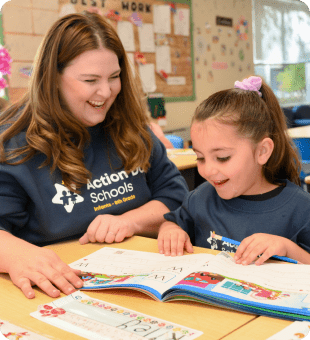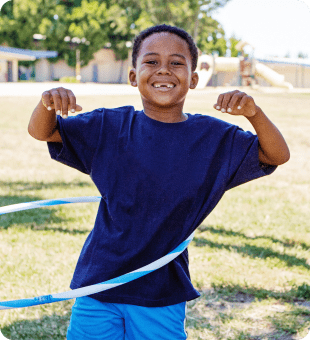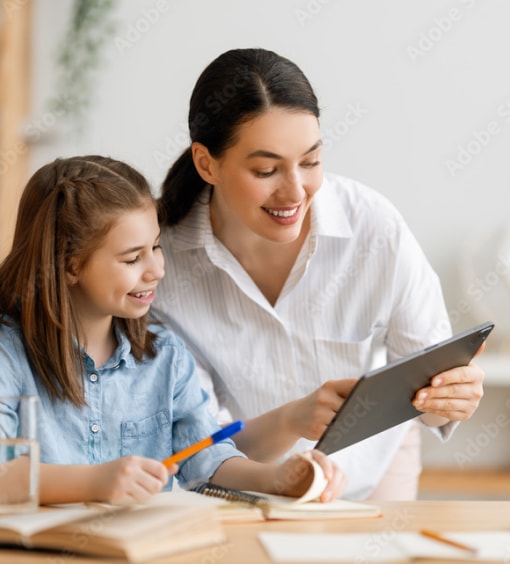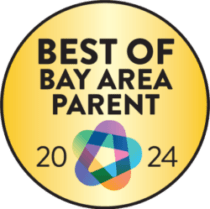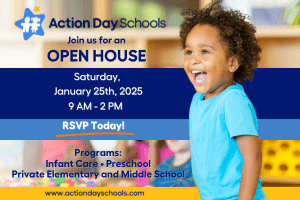Grades 1-4
Our private elementary school program is equally renowned for its top-tier academics and hands-on, whole-child approach. We engage young students in meaningful learning experiences that promote critical-thinking, creativity, and social development.
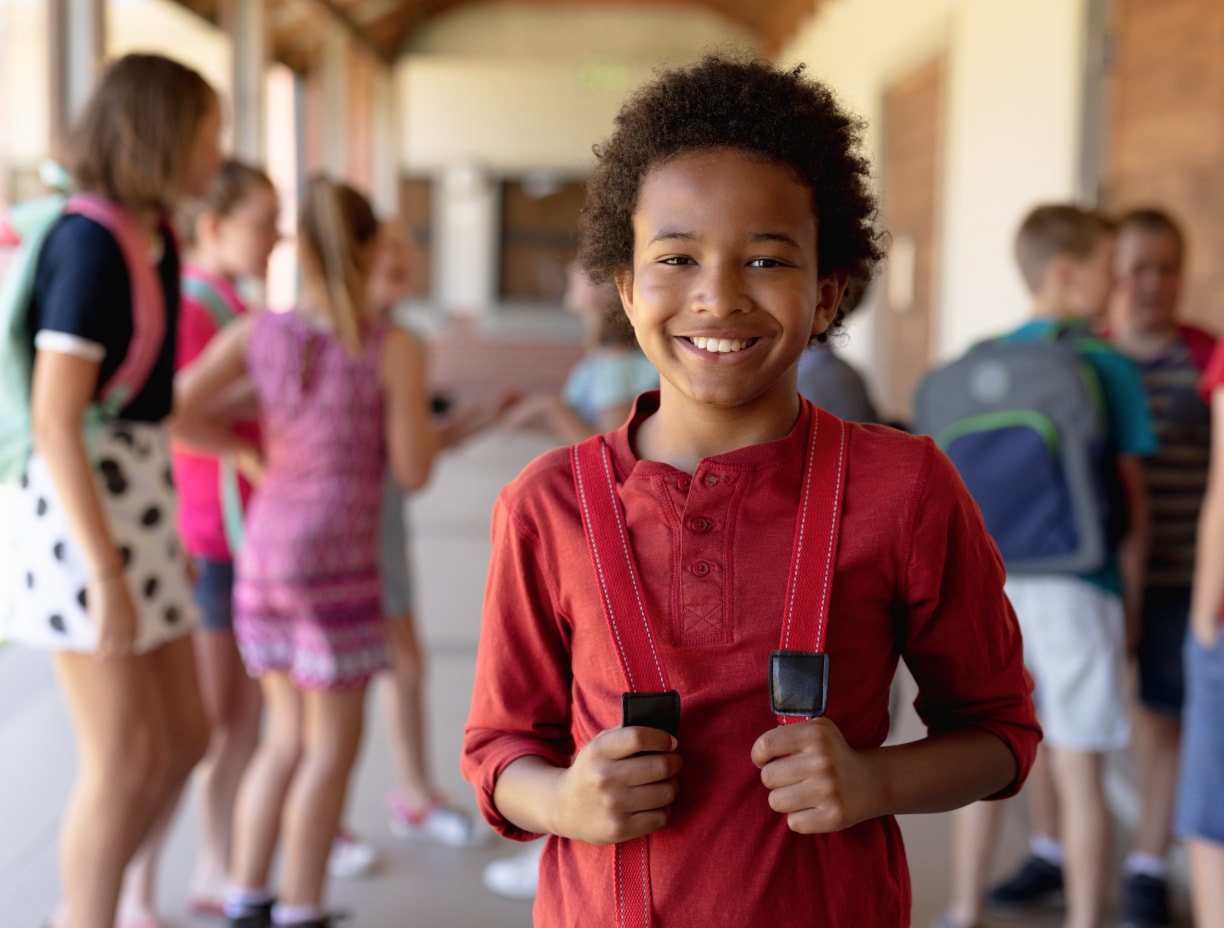
Building a Solid Foundation
In grades 1-4, students follow a progressive program across all core subjects; lessons build in complexity as they gain knowledge and skill. A focus on experiential learning (group projects, discussions, labs, etc.) helps build emotional and social competencies, too.
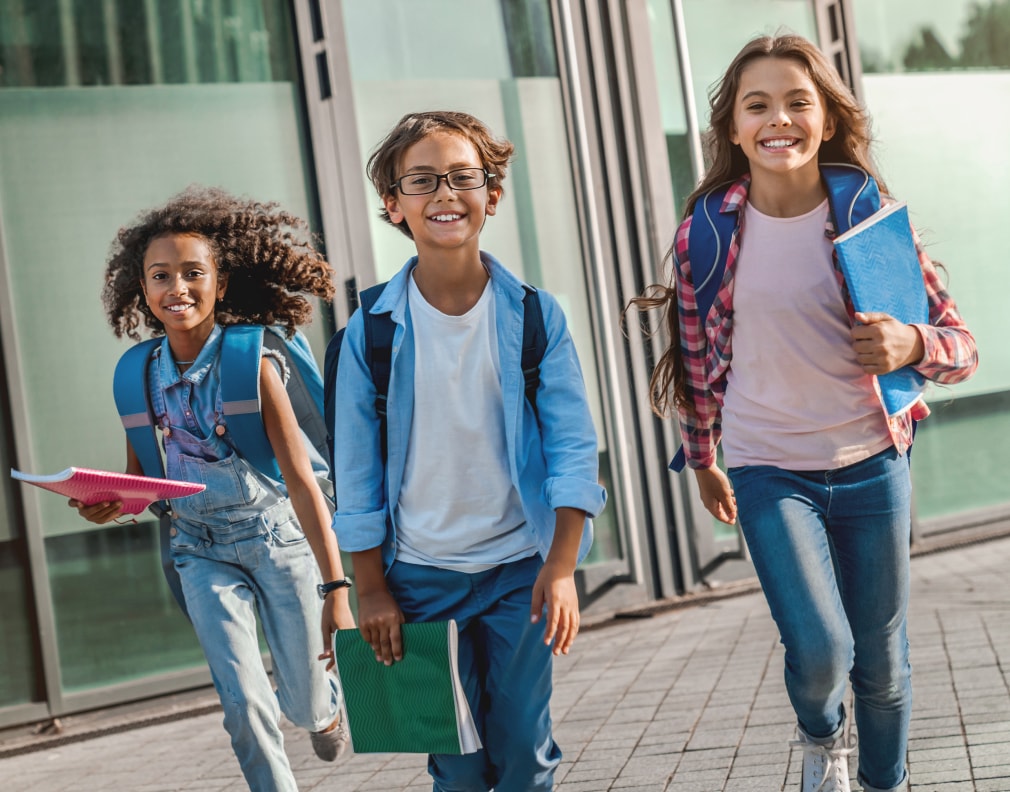
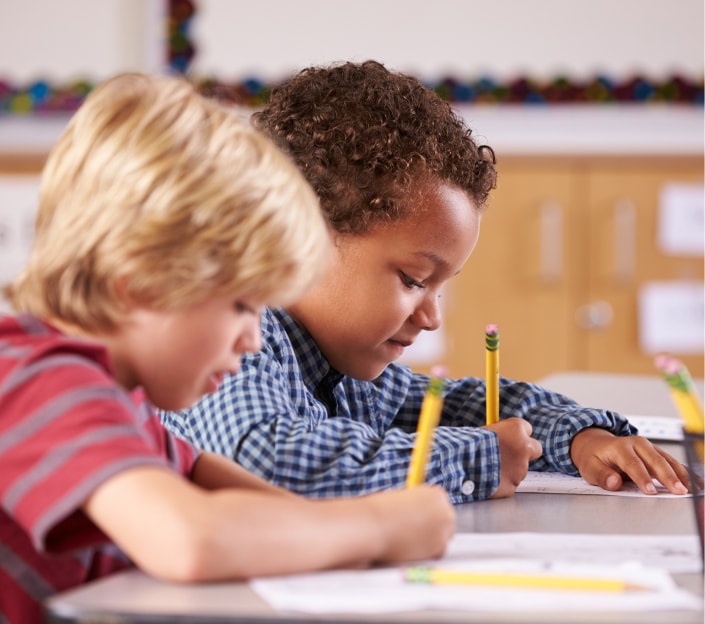
Small Class Synergy
Small class sizes help our teachers nurture each student’s progress toward academic, social, and personal goals. They create a safe space for children to ask questions, share ideas, and feel like they belong.
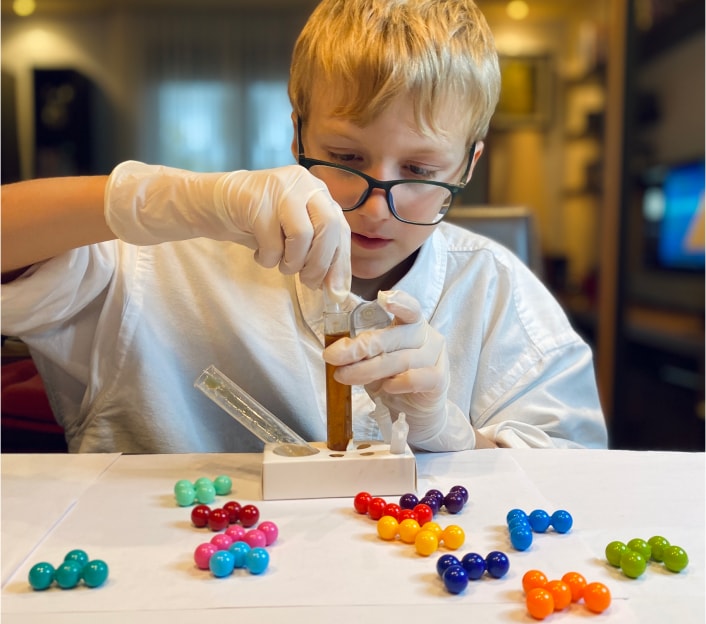
Hands-On Learning
We pride ourselves on maximizing engagement in the classroom. Through various interactive activities and projects, students think critically, make observations, and share creative solutions to real-world problems.
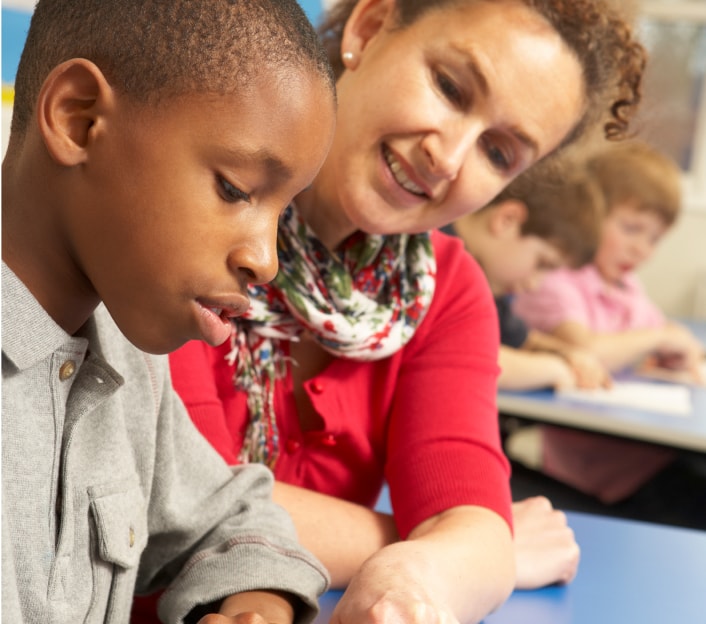
Balanced Curriculum
As students conquer core academic subjects, we also introduce exciting enrichments and extracurriculars to help students practice self-expression, creative thinking, and develop unique interests and talents.
Elementary Curriculum
 Expressive Arts
Expressive Arts Computer Science
Computer Science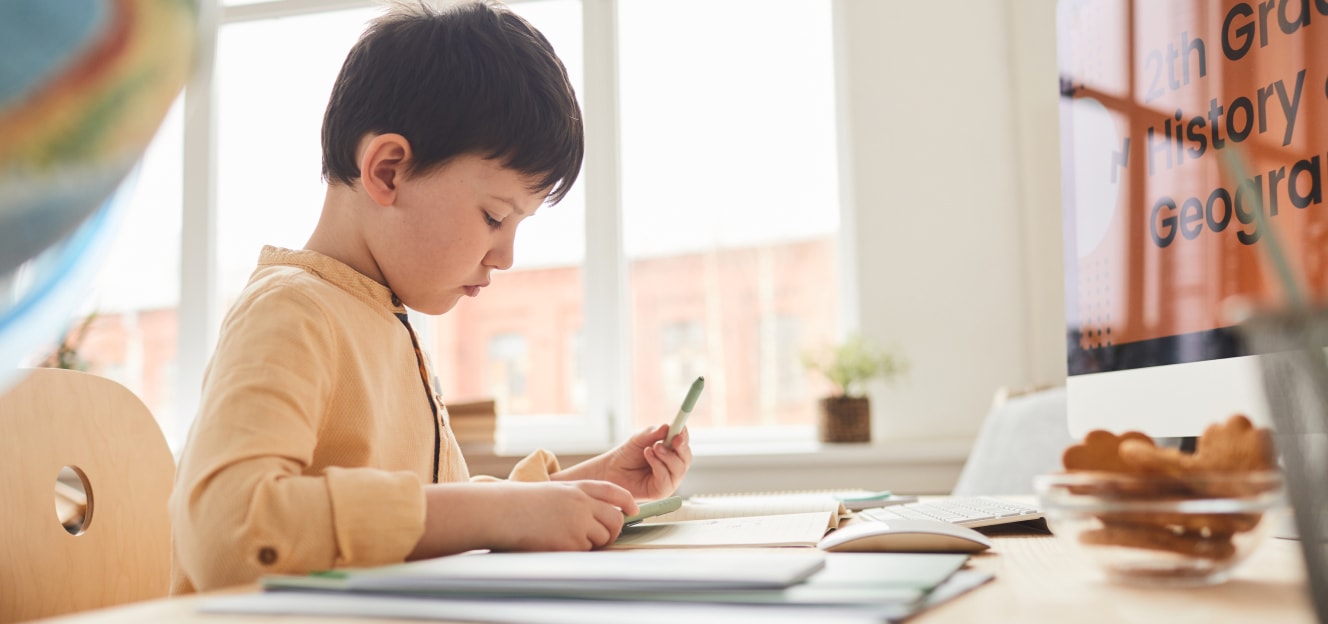
Language Arts
Students dive into reading and continue to hone their writing and speaking skills. Lessons explore:
- Letter Patterns, Spelling, Syllabication & Word Parts
- Phonics and Phonemic Awareness
- Reading Fluency and Comprehension/ Novel Study
- Vocabulary & Context Clues
- Oral Language: Listening and Speaking
- Handwriting Practice
- Composing Sentences into Paragraphs
- Grammar & Punctuation
- Vocabulary & Context Clues
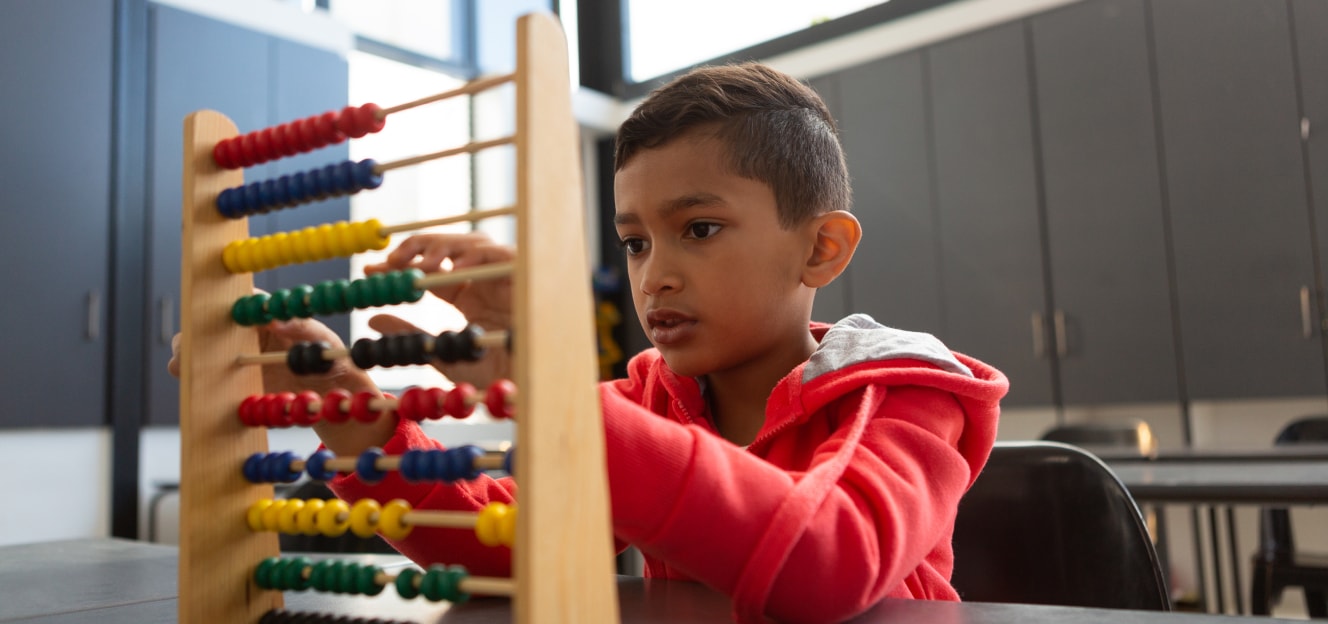
Mathematics
We show the kids that math is fun! Through mathematical modeling, visual representations and real-world problem-based learning, our students build procedural fluency and higher-order thinking skills. Students explore:
- Place Value: Numbers to One Million
- Multiplication and Division Facts
- Use Operations with Whole Numbers to Solve Problems
- Number Patterns, Factors, and Divisibility
- Fraction Equivalence, Ordering, Addition and Subtraction, Multiplication adn Division of Fractions
- Compare and Add and Subtract Decimals
- Collect, Represent, and Analyze Numerical Data
- Measure Angles and Geometric Figures
- Convert Measurements Using Multiplication and Division
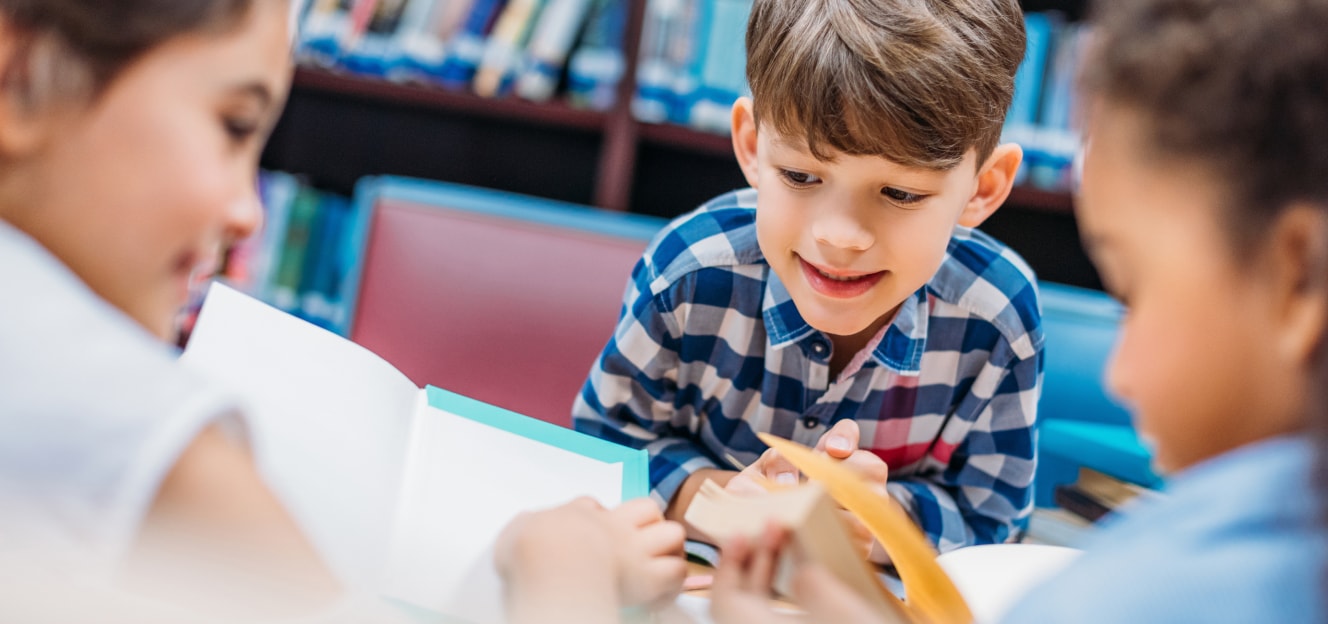
Social Studies
Students dive into the world of rights and responsibilities and explore what it means to be a citizen and part of a community. Topics include:
- Geography (continents, oceans)
- Diversity, Cultural Backgrounds
- Citizenship
- Simple Economics
- Personal Accountability
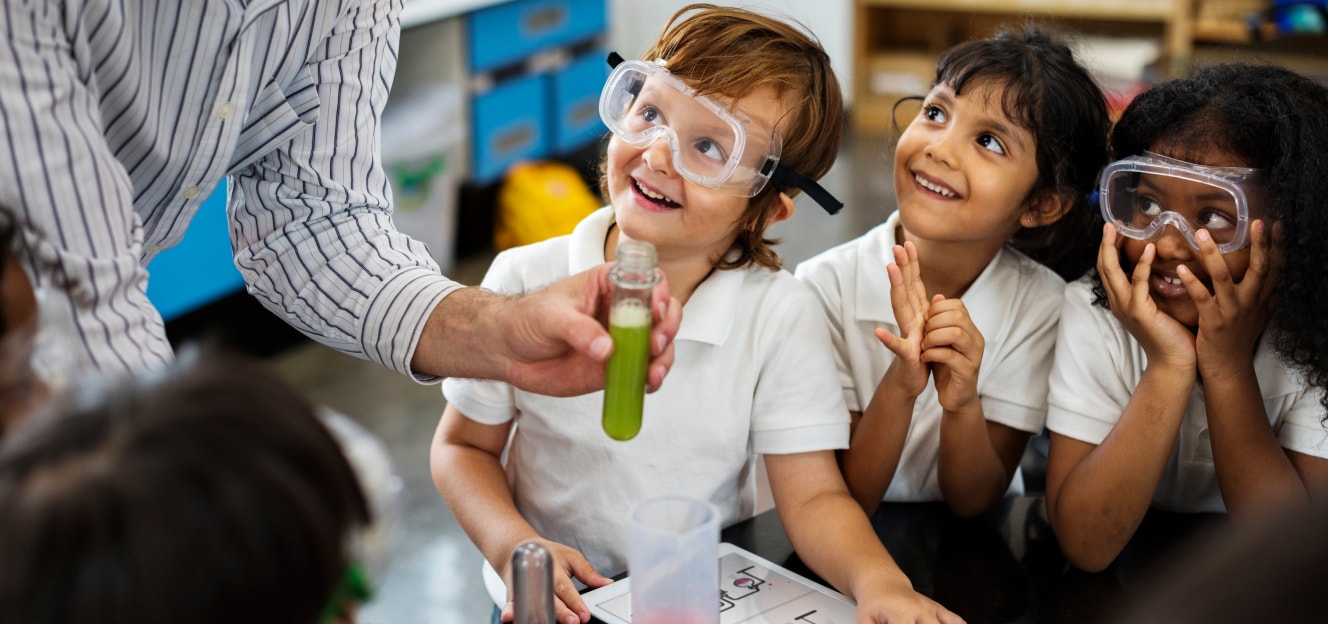
Science & Health
Science incorporates fun, hands-on investigations, engineering models, literacy-rich activities, and interactive digital tools to empower students to think, read, write, and argue like real scientists. Designed by UC Berkeley’s Lawrence Hall of Science, our natural phenomena-based porgram is aligned to the Next Generation Science Standards. Elements of our program include:
- Life Science: Animal and Plant Defenses
- Physical Science: Light and Sound
- Earth and Space: Spinning Earth
- Wellness, Nutrition & Healthy Habits
- Scientific Method and Science Fair Exhibitions
- Science Careers and Field Trips
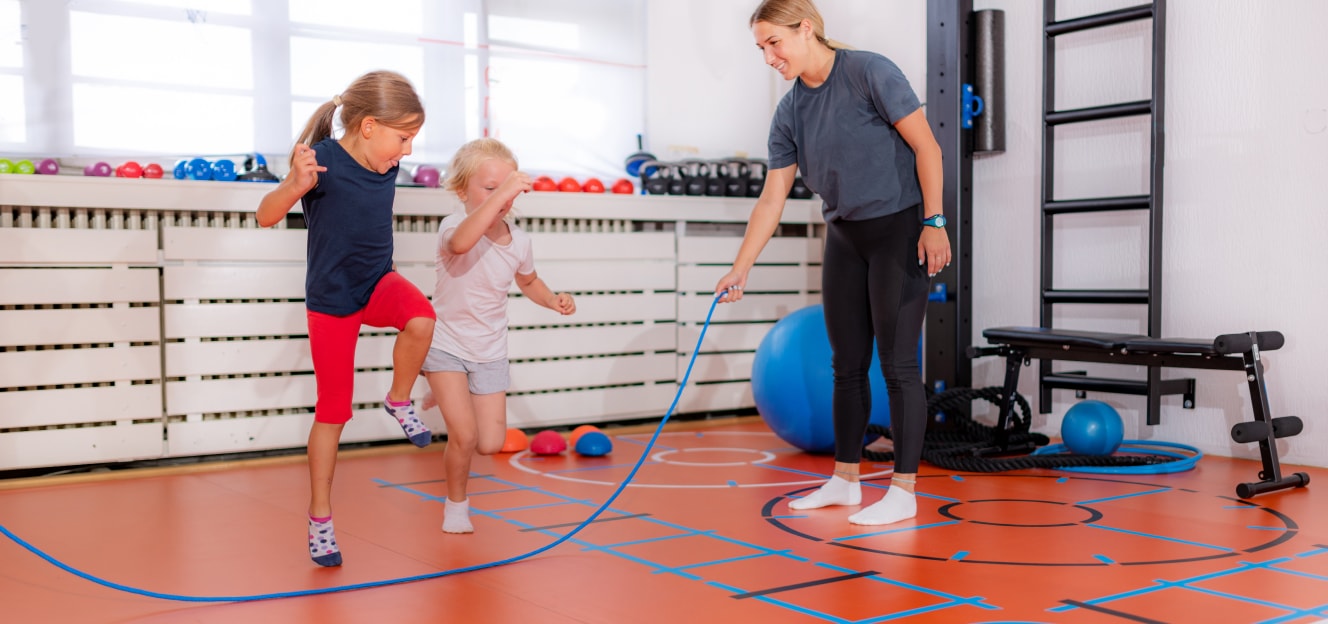
Physical Education
Time to get moving! We introduce various games and activities to promote physical activity and well-being. Students practice:
- Making Healthy Choices
- Good Sportsmanship
- Basic Motor Skills
- Fitness Tests
- Goal Setting
 Expressive Arts
Expressive ArtsExpressive Arts
Expressive Arts in Grade 1 is about cultivating well-being and encouraging students to express themselves using different media. Our comprehensive Expressive Arts program includes Visual Arts, Music, Drama, and Dance.
- Visual Arts: Lessons on the visual arts illustrate important elements of making and appreciating art, and emphasize important artists, and works of art from various periods. Students integrate techniques in their directed and free art. Elements include
- Artistic concepts of portraits, still life, murals,, and architecture.
- Artist-of-the-Month studies
- Generally recognized elements of art – line, shape, form, space, light, texture, and color.
- Music and Dance: The Music program focuses on listening to, enjoying, and appreciating music in all its various forms, inspiring creative movement, as well as producing music. Elements include:
- Dedicated music teacher
- Tempo, percussion, beat and rhythm.
- Orchestra, Opera, Instrumental Music, Ballet and Jazz.
- Dance, movement
- Composer-of-the-Month study
- Group musical experiences and performances
- Holiday recitals to showcase the musical talent of our young musicians!
 Computer Science
Computer ScienceComputer Science
Aligned with national standards, the Computer Science program aims to develop students as responsible digital architects, providing opportunities to discover their innovator’s mindset and create inspiring products. The elements of our program include:
- Digital Well-Being
- Keyboarding
- Hardware
- Digital Media
- Coding and Robotics
- Participation in the nationwide Hour of Code
 Expressive Arts
Expressive Arts Computer Science
Computer Science
Language Arts
Students advance their reading and writing skills and explore more complex texts. Lessons include:
- Reading Comprehension / Analysis
- Syllabication & Word Parts
- Grammar (nouns, verbs, adjectives)
- Singular & Plural Nouns
- Complete & Incomplete Sentences
- Oral Recitations

Mathematics
Second graders learn new tricks, exploring more complex math concepts and problem-solving skills. We introduce:
- Place Value (up to 1,000)
- Addition & Subtraction (two and three digits)
- Multiplication
- Properties of Geometric Shapes
- Simple Fractions

Social Studies
Students get to know important historical figures, from inventors to activists and begin to understand timelines, maps, and basic civics. Topics include:
- Geography
- Community Types (urban, rural, suburban, etc)
- Simple Economics
- Local Government
- Family History
Science incorporates fun, hands-on investigations, engineering models, literacy-rich activities, and interactive digital tools to empower students to think, read, write, and argue like real scientists. Designed by UC Berkeley’s Lawrence Hall of Science, our natural phenomena-based program is aligned to the Next Generation Science Standards. Elements of our program include:
- Life Science: Plant and Animal Relationships
- Physical Science: Properties of Materials
- Earth and Space: Changing Landforms
- Wellness, Nutrition & Healthy Habits
- Scientific Method and Science Fair Exhibitions
- Science Careers and Field Trips

Physical Education
Students learn why it’s important to be active and participate in various activities to develop athletic and social skills. We practice:
- Making Healthy Choices
- Coordination, Balance & Agility
- Good Sportsmanship
- Flexibility & Stretching
- Team Sports
- Fitness Circuits & Testing
 Expressive Arts
Expressive ArtsExpressive Arts
Expressive Arts in Grade 2 is about cultivating well-being and encouraging students to express themselves using different media. Our comprehensive Expressive Arts program includes Visual Arts, Music, Drama, and Dance.
- Visual Arts: Lessons on the visual arts illustrate important elements of making and appreciating art, and emphasize important artists, and works of art from various periods. Students integrate techniques in their directed and free art. Elements include
- Artistic concepts of Landscape, Architecture, and Abstraction
- Artist-of-the-Month studies
- Generally recognized elements of art – line, shape, form, space, light, texture, and color.
- Music and Dance: The Music program focuses on listening to, enjoying, and appreciating music in all its various forms, inspiring creative movement, as well as producing music. Elements include:
- Dedicated music teacher
- Tempo, percussion, beat, and rhythm.
- Orchestra, Opera, Instrumental Music, Ballet and Jazz.
- Dance, movement
- Composer-of-the-Month study
- Group musical experiences and performances
- Holiday recitals to showcase the musical talent of our young musicians!
 Computer Science
Computer ScienceComputer Science
Aligned with national standards, the Computer Science program aims to develop students as responsible digital architects, providing opportunities to discover their innovator’s mindset and create inspiring products. The elements of our program include:
- Digital Well-Being
- Keyboarding
- Hardware
- Digital Media
- Coding and Robotics
- Participation in the nationwide Hour of Code
 Expressive Arts
Expressive Arts Computer Science
Computer Science
Language Arts
Students become skilled readers and writers who explore literacy and communication at greater depths. Lessons include:
- Reading Comprehension / Analysis
- Composition (multi-paragraph texts)
- Spelling and Vocabulary
- Reading Fluency and Comprehension/ Novel Study
- Cursive Handwriting Practice
- Grammar & Punctuation
- Oral Language: Listening and Speaking

Mathematics
Through mathematical modeling, visual representations, and real-world problem-based learning, our students build procedural fluency and higher-order thinking skills. Students expand on:
- Place Value (up to thousands)
- Addition & Subtraction
- Multiplication & Division
- Number Patterns
- Data Analysis & Graphing
- Fractions

Social Studies
Students learn about our local topography and gain valuable insights into the history of our community. They also explore:
- Geography (countries, states, major cities)
- Native American History
- California Missions
- Gold Rush
- Simple Economics
- State Government & History

Science & Health
Science incorporates fun, hands-on investigations, engineering models, literacy-rich activities, and interactive digital tools to empower students to think, read, write, and argue like real scientists. Designed by UC Berkeley’s Lawrence Hall of Science, our natural phenomena-based program is aligned to the Next Generation Science Standards. Elements of our program include:
- Life Science: Inheritance and Traits
- Physical Science: Balancing Forces
- Earth and Space: Weather and Climate
- Environments and Survival
- Wellness, Nutrition & Healthy Habits
- Scientific Method and Science Fair Exhibitions
- Science Careers and Field Trips

Physical Education
Students learn why it’s important to be active and participate in various activities to develop athletic and social skills. We practice:
- Making Healthy Choices
- Coordination, Balance & Agility
- Good Sportsmanship
- Flexibility & Stretching
- Team Sports
- Fitness Circuits & Testing
 Expressive Arts
Expressive ArtsExpressive Arts
Expressive Arts in Grade 3 is about cultivating well-being and encouraging students to express themselves using different media. Our comprehensive Expressive Arts program includes Visual Arts, Music, Drama, and Dance.
- Visual Arts: Lessons on the visual arts illustrate important elements of making and appreciating art, and emphasize important artists, and works of art from various periods. Students integrate techniques in their directed and free art. Elements include
- Artistic concepts of Landscape, Architecture, and Abstraction
- Artist-of-the-Month studies
- Generally recognized elements of art – line, shape, form, space, light, texture, and color and how they work together.
- American and Global Art
- Music and Dance: The Music program focuses on listening to, enjoying, and appreciating music in all its various forms, inspiring creative movement, as well as producing music. Elements include:
- Dedicated music teacher
- Vocal Ranges, tempo, percussion, beat and rhythm
- Orchestra, Opera, Instrumental Music, Ballet and Jazz.
- Dance, movement
- Composer-of-the-Month study
- Group musical experiences and performances
- Holiday recitals to showcase the musical talent of our young musicians!
 Computer Science
Computer ScienceComputer Science
Aligned with national standards, the Computer Science program aims to develop students as responsible digital architects, providing opportunities to discover their innovator’s mindset and create inspiring products. The elements of our program include:
- Digital Well-Being
- Keyboarding
- Hardware
- Digital Media
- Coding and Robotics
- Artificial Intelligence
- Participation in the nationwide Hour of Code
 Expressive Arts
Expressive Arts Computer Science
Computer Science
Language Arts
Students do more independent reading and learn about credible references, citations, and other research skills. Lessons include:
- Reading Comprehension/ Thematic Analysis
- Research Skills
- Reading Comprehension and Fluency (Reading w/ Pacing & Expression). Novel Study.
- Composition (multi-paragraph texts)
- Spelling and Vocabulary
- Grammar & Punctuation
- Oral Language: Listening and Speaking

Mathematics
Through mathematical modeling, visual representations and real-world problem-based learning, our students build procedural fluency and higher order thinking skills. Students solve problems with skill and logic, exploring the order of operations, formulas, and other advanced concepts. They study::
- Place Value & Expanded Notation
- Decimals
- Data Analysis & Graphing
- Addition & Subtraction
- Multiplication & Division
- Fractions
- Number Patterns

Social Studies
Students deepen their understanding of history, geography, community, and culture. They study:
- Geography (countries, states, major cities)
- Famous Historical Figures
- Cultural Diversity & Influence
- Native American History
- Early Exploration & Colonization
- State Government & History
- Economic Development
- Research Skills
- Basic Civics

Science/Health
Science incorporates fun, hands-on investigations, engineering models, literacy-rich activities, and interactive digital tools to empower students to think, read, write, and argue like real scientists. Designed by UC Berkeley’s Lawrence Hall of Science, our natural phenomena-based program is aligned to the Next Generation Science Standards. Elements of our program include:
- Integrated Unit: Vision and Light
- Integrated Unit:: Energy Conversions
- Earth Science: Earth’s Features
- Waves, Energy, and Information
- Wellness, Nutrition & Healthy Habits
- Scientific Method and Science Fair Exhibitions
- Science Careers and Field Trips

Physical Education
Students learn why it’s important to be active and participate in various activities to develop athletic and social skills. We practice:
- Making Healthy Choices
- Coordination, Balance & Agility
- Good Sportsmanship
- Flexibility & Stretching
- Team Sports
- Fitness Circuits & Testing
 Expressive Arts
Expressive ArtsExpressive Arts in Grade 4 is about cultivating well-being and encouraging students to express themselves using different media. Our comprehensive Expressive Arts program includes Visual Arts, Music, Drama, and Dance.
- Visual Arts: Lessons on the visual arts illustrate important elements of making and appreciating art, and emphasize important artists, and works of art from various periods. Students integrate techniques in their directed and free art. Elements include
- Artistic concepts of Landscape, Architecture, and Abstraction
- Artist-of-the-Month studies
- Generally recognized elements of art – line, shape, form, space, light, texture, and color and how they work together.
- American and Global Art
- Music and Dance: The Music program focuses on listening to, enjoying, and appreciating music in all its various forms, inspiring creative movement, as well as producing music. Elements include:
- Dedicated music teacher
- Vocal Ranges, tempo, percussion, beat and rhythm
- Orchestra, Opera, Instrumental Music, Ballet and Jazz.
- Dance, movement
- Composer-of-the-Month study
- Group musical experiences and performances
- Holiday recitals to showcase the musical talent of our young musicians!
 Computer Science
Computer ScienceComputer Science
Aligned with national standards, the Computer Science program aims to develop students as responsible digital architects, providing opportunities to discover their innovator’s mindset and create inspiring products. The elements of our program include:
- Digital Well-Being
- Keyboarding
- Hardware
- Digital Media
- Coding and Robotics
- Artificial Intelligence
- Participation in the nationwide Hour of Code
 Expressive Arts
Expressive Arts Computer Science
Computer Science
Language Arts
Students dive into reading and continue to hone their writing and speaking skills. Lessons explore:
- Letter Patterns, Spelling, Syllabication & Word Parts
- Phonics and Phonemic Awareness
- Reading Fluency and Comprehension/ Novel Study
- Vocabulary & Context Clues
- Oral Language: Listening and Speaking
- Handwriting Practice
- Composing Sentences into Paragraphs
- Grammar & Punctuation
- Vocabulary & Context Clues

Mathematics
We show the kids that math is fun! Through mathematical modeling, visual representations and real-world problem-based learning, our students build procedural fluency and higher-order thinking skills. Students explore:
- Place Value: Numbers to One Million
- Multiplication and Division Facts
- Use Operations with Whole Numbers to Solve Problems
- Number Patterns, Factors, and Divisibility
- Fraction Equivalence, Ordering, Addition and Subtraction, Multiplication adn Division of Fractions
- Compare and Add and Subtract Decimals
- Collect, Represent, and Analyze Numerical Data
- Measure Angles and Geometric Figures
- Convert Measurements Using Multiplication and Division

Social Studies
Students dive into the world of rights and responsibilities and explore what it means to be a citizen and part of a community. Topics include:
- Geography (continents, oceans)
- Diversity, Cultural Backgrounds
- Citizenship
- Simple Economics
- Personal Accountability

Science & Health
Science incorporates fun, hands-on investigations, engineering models, literacy-rich activities, and interactive digital tools to empower students to think, read, write, and argue like real scientists. Designed by UC Berkeley’s Lawrence Hall of Science, our natural phenomena-based porgram is aligned to the Next Generation Science Standards. Elements of our program include:
- Life Science: Animal and Plant Defenses
- Physical Science: Light and Sound
- Earth and Space: Spinning Earth
- Wellness, Nutrition & Healthy Habits
- Scientific Method and Science Fair Exhibitions
- Science Careers and Field Trips

Physical Education
Time to get moving! We introduce various games and activities to promote physical activity and well-being. Students practice:
- Making Healthy Choices
- Good Sportsmanship
- Basic Motor Skills
- Fitness Tests
- Goal Setting
 Expressive Arts
Expressive ArtsExpressive Arts
Expressive Arts in Grade 1 is about cultivating well-being and encouraging students to express themselves using different media. Our comprehensive Expressive Arts program includes Visual Arts, Music, Drama, and Dance.
- Visual Arts: Lessons on the visual arts illustrate important elements of making and appreciating art, and emphasize important artists, and works of art from various periods. Students integrate techniques in their directed and free art. Elements include
- Artistic concepts of portraits, still life, murals,, and architecture.
- Artist-of-the-Month studies
- Generally recognized elements of art – line, shape, form, space, light, texture, and color.
- Music and Dance: The Music program focuses on listening to, enjoying, and appreciating music in all its various forms, inspiring creative movement, as well as producing music. Elements include:
- Dedicated music teacher
- Tempo, percussion, beat and rhythm.
- Orchestra, Opera, Instrumental Music, Ballet and Jazz.
- Dance, movement
- Composer-of-the-Month study
- Group musical experiences and performances
- Holiday recitals to showcase the musical talent of our young musicians!
 Computer Science
Computer ScienceComputer Science
Aligned with national standards, the Computer Science program aims to develop students as responsible digital architects, providing opportunities to discover their innovator’s mindset and create inspiring products. The elements of our program include:
- Digital Well-Being
- Keyboarding
- Hardware
- Digital Media
- Coding and Robotics
- Participation in the nationwide Hour of Code
 Expressive Arts
Expressive Arts Computer Science
Computer Science
Language Arts
Students advance their reading and writing skills and explore more complex texts. Lessons include:
- Reading Comprehension / Analysis
- Syllabication & Word Parts
- Grammar (nouns, verbs, adjectives)
- Singular & Plural Nouns
- Complete & Incomplete Sentences
- Oral Recitations

Mathematics
Second graders learn new tricks, exploring more complex math concepts and problem-solving skills. We introduce:
- Place Value (up to 1,000)
- Addition & Subtraction (two and three digits)
- Multiplication
- Properties of Geometric Shapes
- Simple Fractions

Social Studies
Students get to know important historical figures, from inventors to activists and begin to understand timelines, maps, and basic civics. Topics include:
- Geography
- Community Types (urban, rural, suburban, etc)
- Simple Economics
- Local Government
- Family History
Science incorporates fun, hands-on investigations, engineering models, literacy-rich activities, and interactive digital tools to empower students to think, read, write, and argue like real scientists. Designed by UC Berkeley’s Lawrence Hall of Science, our natural phenomena-based program is aligned to the Next Generation Science Standards. Elements of our program include:
- Life Science: Plant and Animal Relationships
- Physical Science: Properties of Materials
- Earth and Space: Changing Landforms
- Wellness, Nutrition & Healthy Habits
- Scientific Method and Science Fair Exhibitions
- Science Careers and Field Trips

Physical Education
Students learn why it’s important to be active and participate in various activities to develop athletic and social skills. We practice:
- Making Healthy Choices
- Coordination, Balance & Agility
- Good Sportsmanship
- Flexibility & Stretching
- Team Sports
- Fitness Circuits & Testing
 Expressive Arts
Expressive ArtsExpressive Arts
Expressive Arts in Grade 2 is about cultivating well-being and encouraging students to express themselves using different media. Our comprehensive Expressive Arts program includes Visual Arts, Music, Drama, and Dance.
- Visual Arts: Lessons on the visual arts illustrate important elements of making and appreciating art, and emphasize important artists, and works of art from various periods. Students integrate techniques in their directed and free art. Elements include
- Artistic concepts of Landscape, Architecture, and Abstraction
- Artist-of-the-Month studies
- Generally recognized elements of art – line, shape, form, space, light, texture, and color.
- Music and Dance: The Music program focuses on listening to, enjoying, and appreciating music in all its various forms, inspiring creative movement, as well as producing music. Elements include:
- Dedicated music teacher
- Tempo, percussion, beat, and rhythm.
- Orchestra, Opera, Instrumental Music, Ballet and Jazz.
- Dance, movement
- Composer-of-the-Month study
- Group musical experiences and performances
- Holiday recitals to showcase the musical talent of our young musicians!
 Computer Science
Computer ScienceComputer Science
Aligned with national standards, the Computer Science program aims to develop students as responsible digital architects, providing opportunities to discover their innovator’s mindset and create inspiring products. The elements of our program include:
- Digital Well-Being
- Keyboarding
- Hardware
- Digital Media
- Coding and Robotics
- Participation in the nationwide Hour of Code
 Expressive Arts
Expressive Arts Computer Science
Computer Science
Language Arts
Students become skilled readers and writers who explore literacy and communication at greater depths. Lessons include:
- Reading Comprehension / Analysis
- Composition (multi-paragraph texts)
- Spelling and Vocabulary
- Reading Fluency and Comprehension/ Novel Study
- Cursive Handwriting Practice
- Grammar & Punctuation
- Oral Language: Listening and Speaking

Mathematics
Through mathematical modeling, visual representations, and real-world problem-based learning, our students build procedural fluency and higher-order thinking skills. Students expand on:
- Place Value (up to thousands)
- Addition & Subtraction
- Multiplication & Division
- Number Patterns
- Data Analysis & Graphing
- Fractions

Social Studies
Students learn about our local topography and gain valuable insights into the history of our community. They also explore:
- Geography (countries, states, major cities)
- Native American History
- California Missions
- Gold Rush
- Simple Economics
- State Government & History

Science & Health
Science incorporates fun, hands-on investigations, engineering models, literacy-rich activities, and interactive digital tools to empower students to think, read, write, and argue like real scientists. Designed by UC Berkeley’s Lawrence Hall of Science, our natural phenomena-based program is aligned to the Next Generation Science Standards. Elements of our program include:
- Life Science: Inheritance and Traits
- Physical Science: Balancing Forces
- Earth and Space: Weather and Climate
- Environments and Survival
- Wellness, Nutrition & Healthy Habits
- Scientific Method and Science Fair Exhibitions
- Science Careers and Field Trips

Physical Education
Students learn why it’s important to be active and participate in various activities to develop athletic and social skills. We practice:
- Making Healthy Choices
- Coordination, Balance & Agility
- Good Sportsmanship
- Flexibility & Stretching
- Team Sports
- Fitness Circuits & Testing
 Expressive Arts
Expressive ArtsExpressive Arts
Expressive Arts in Grade 3 is about cultivating well-being and encouraging students to express themselves using different media. Our comprehensive Expressive Arts program includes Visual Arts, Music, Drama, and Dance.
- Visual Arts: Lessons on the visual arts illustrate important elements of making and appreciating art, and emphasize important artists, and works of art from various periods. Students integrate techniques in their directed and free art. Elements include
- Artistic concepts of Landscape, Architecture, and Abstraction
- Artist-of-the-Month studies
- Generally recognized elements of art – line, shape, form, space, light, texture, and color and how they work together.
- American and Global Art
- Music and Dance: The Music program focuses on listening to, enjoying, and appreciating music in all its various forms, inspiring creative movement, as well as producing music. Elements include:
- Dedicated music teacher
- Vocal Ranges, tempo, percussion, beat and rhythm
- Orchestra, Opera, Instrumental Music, Ballet and Jazz.
- Dance, movement
- Composer-of-the-Month study
- Group musical experiences and performances
- Holiday recitals to showcase the musical talent of our young musicians!
 Computer Science
Computer ScienceComputer Science
Aligned with national standards, the Computer Science program aims to develop students as responsible digital architects, providing opportunities to discover their innovator’s mindset and create inspiring products. The elements of our program include:
- Digital Well-Being
- Keyboarding
- Hardware
- Digital Media
- Coding and Robotics
- Artificial Intelligence
- Participation in the nationwide Hour of Code
 Expressive Arts
Expressive Arts Computer Science
Computer Science
Language Arts
Students do more independent reading and learn about credible references, citations, and other research skills. Lessons include:
- Reading Comprehension/ Thematic Analysis
- Research Skills
- Reading Comprehension and Fluency (Reading w/ Pacing & Expression). Novel Study.
- Composition (multi-paragraph texts)
- Spelling and Vocabulary
- Grammar & Punctuation
- Oral Language: Listening and Speaking

Mathematics
Through mathematical modeling, visual representations and real-world problem-based learning, our students build procedural fluency and higher order thinking skills. Students solve problems with skill and logic, exploring the order of operations, formulas, and other advanced concepts. They study::
- Place Value & Expanded Notation
- Decimals
- Data Analysis & Graphing
- Addition & Subtraction
- Multiplication & Division
- Fractions
- Number Patterns

Social Studies
Students deepen their understanding of history, geography, community, and culture. They study:
- Geography (countries, states, major cities)
- Famous Historical Figures
- Cultural Diversity & Influence
- Native American History
- Early Exploration & Colonization
- State Government & History
- Economic Development
- Research Skills
- Basic Civics

Science/Health
Science incorporates fun, hands-on investigations, engineering models, literacy-rich activities, and interactive digital tools to empower students to think, read, write, and argue like real scientists. Designed by UC Berkeley’s Lawrence Hall of Science, our natural phenomena-based program is aligned to the Next Generation Science Standards. Elements of our program include:
- Integrated Unit: Vision and Light
- Integrated Unit:: Energy Conversions
- Earth Science: Earth’s Features
- Waves, Energy, and Information
- Wellness, Nutrition & Healthy Habits
- Scientific Method and Science Fair Exhibitions
- Science Careers and Field Trips

Physical Education
Students learn why it’s important to be active and participate in various activities to develop athletic and social skills. We practice:
- Making Healthy Choices
- Coordination, Balance & Agility
- Good Sportsmanship
- Flexibility & Stretching
- Team Sports
- Fitness Circuits & Testing
 Expressive Arts
Expressive ArtsExpressive Arts in Grade 4 is about cultivating well-being and encouraging students to express themselves using different media. Our comprehensive Expressive Arts program includes Visual Arts, Music, Drama, and Dance.
- Visual Arts: Lessons on the visual arts illustrate important elements of making and appreciating art, and emphasize important artists, and works of art from various periods. Students integrate techniques in their directed and free art. Elements include
- Artistic concepts of Landscape, Architecture, and Abstraction
- Artist-of-the-Month studies
- Generally recognized elements of art – line, shape, form, space, light, texture, and color and how they work together.
- American and Global Art
- Music and Dance: The Music program focuses on listening to, enjoying, and appreciating music in all its various forms, inspiring creative movement, as well as producing music. Elements include:
- Dedicated music teacher
- Vocal Ranges, tempo, percussion, beat and rhythm
- Orchestra, Opera, Instrumental Music, Ballet and Jazz.
- Dance, movement
- Composer-of-the-Month study
- Group musical experiences and performances
- Holiday recitals to showcase the musical talent of our young musicians!
 Computer Science
Computer ScienceComputer Science
Aligned with national standards, the Computer Science program aims to develop students as responsible digital architects, providing opportunities to discover their innovator’s mindset and create inspiring products. The elements of our program include:
- Digital Well-Being
- Keyboarding
- Hardware
- Digital Media
- Coding and Robotics
- Artificial Intelligence
- Participation in the nationwide Hour of Code
What to Expect in Elementary School
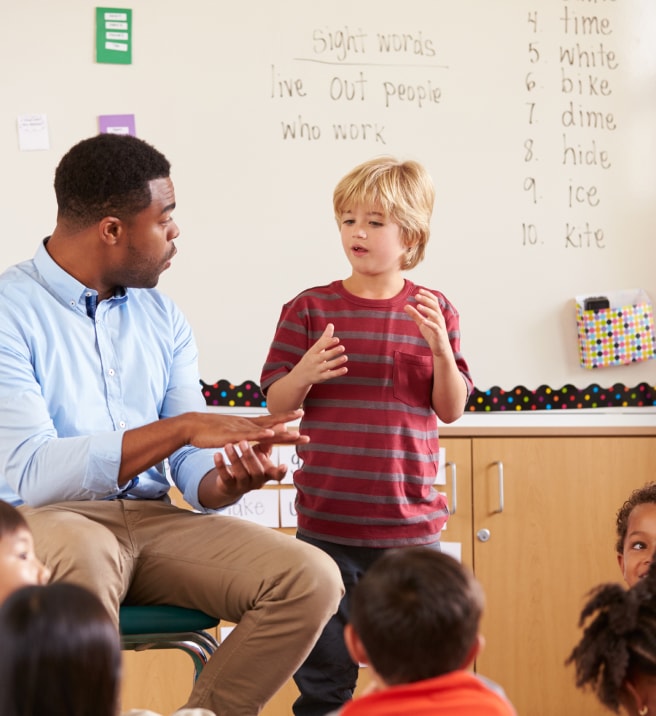
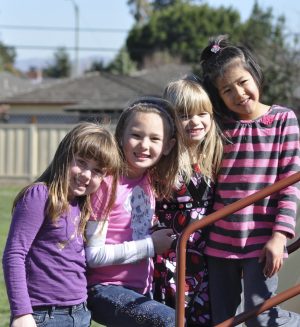
Calendar & Schedule
Elementary School students follow a standard academic calendar (August – June). Students report to class five days a week, for a full day in the classroom.
All of our elementary school programs are broken into three academic periods with two recess breaks.
- Mon – Thurs hours: 8:45am – 3pm
- Wednesday hours: 8:45am – 2pm (early dismissal)
- Options for Extended Care
View and download the Action Day Elementary School 2023-2024 Academic Calendar.
Meals & Nutrition
Students are expected to bring a packed lunch or order a hot lunch through the EZ Schools App.
Our hot lunch program is offered daily at an additional charge.
- Meals feature seasonal fruits and vegetables, nutritious entrees, and water or milk.
- Orders can be placed daily, weekly, or monthly.
- Same-day orders must be placed by 8:45am.
Refrigerators and microwaves are available for lunches brought from home.
Health & Safety
Providing a safe and healthy environment for students is our top priority.
Open Door Policy & Security
- Parents are welcome to visit the campus and classroom at any time, but must sign-in at the office.
- All students must be signed in and out of school each day by a parent or authorized family member/friend.
Emergency Preparedness
- Teachers and staff have been trained in CPR and First Aid.
- All staff have completed comprehensive training in fire, earthquake, and lockdown procedures.
- Regular drill practices are done at all grade levels.
Extend your day with enrichments
At Action Day, learning goes beyond academics. Our enrichment programs are designed to help students develop unique interests and talents—without ever leaving campus. Several options are available to elementary students:
Extend Your School Day
We support families beyond the bell schedule with a daily after-school program. Combining lesson plans and extracurriculars, students enjoy a balance of academics and fun.
